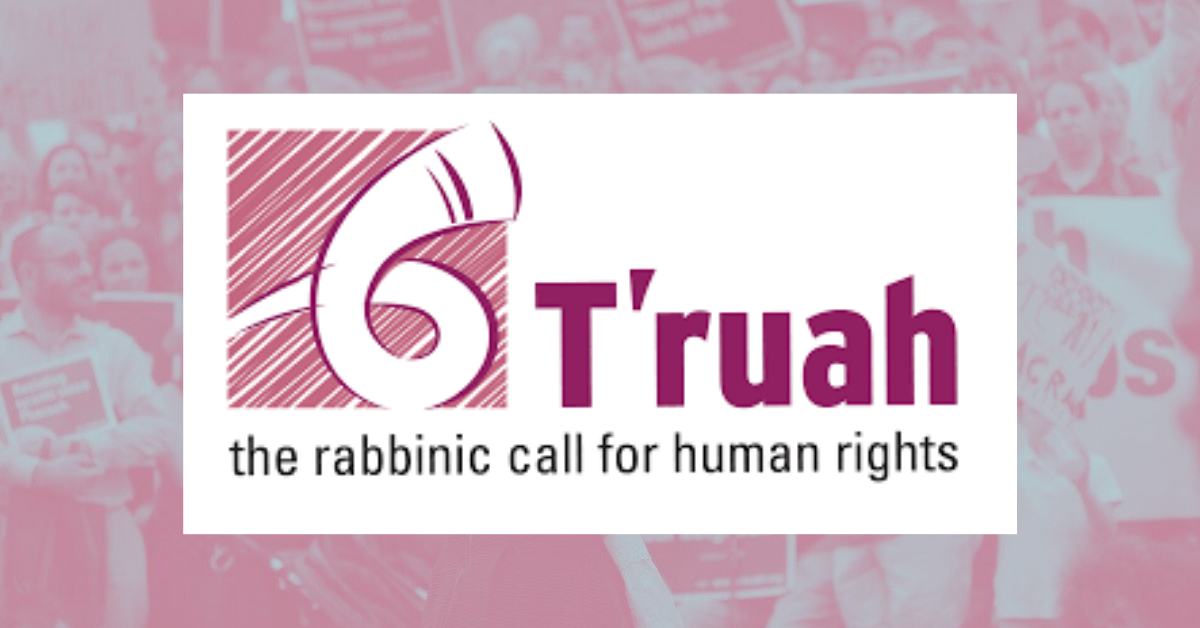Letter organized by T’ruah underlines the country’s moral and legal obligation to vaccinate all residents of occupied territories
NEW YORK — Today, T’ruah, a rabbinic human rights organization, released a letter signed by over 200 rabbis and cantors calling on the Israeli government to equitably distribute vaccines to Palestinians. The number of signatories is expected to grow in the coming days.
The letter is addressed to Israeli Minister of Health Yuli Eldelstein and congratulates Israel on its success in distributing vaccines to Israeli citizens and permanent residents, both Jewish and not, but calls on Israel to take the next step to fulfill its moral and legal responsibility to ensure that all Palestinians living under occupation in the West Bank and Gaza Strip, are vaccinated. Its call for more equitable vaccination cites both Jewish religious teachings and Israel’s obligations under international law.
The letter also expresses support for United States elected officials who have called for Israel to take seriously its responsibility to ensure Palestinians receive the vaccine. It says there are no grounds to construe calls to live up to these obligations as “anti-Israel.”
The letter is available online and is reprinted below:
Minister of Health Yuli Eldelstein
39 Yirmiyahu St. P.O.Box 1176
Jerusalem 9101002
Dear Minister Edelstein,
We, the undersigned rabbis and cantors affiliated with T’ruah: The Rabbinic Call for Human Rights, congratulate the State of Israel on its highly efficient vaccination of its citizens and permanent residents against COVID-19. We also applaud Israel’s transfer of 5,000 vaccine doses to the Palestinian Authority (PA) and its initial steps to vaccinate all incarcerated people, including Palestinians in Israeli military prisons. We now call on Israel to take the next step and to fulfill its moral and legal responsibility to ensure that all residents of the occupied Palestinian territories, including both the West Bank and Gaza Strip, are vaccinated.
We read in the Shulchan Arukh, Judaism’s most authoritative law code, “Some argue that maintaining a synagogue is more important than tzedakah, but tzedakah…to impoverished sick people is even more important than maintaining a synagogue.” (YD 249:16) It is crucial here that we understand tzedakah in its root meaning, not as charity but as obligatory justice.
Under Article 56 of the Fourth Geneva Convention, an occupying power has the obligation to mitigate and prevent communicable diseases and epidemics. The Oslo Accords did nothing to change the Palestinian territories’ status as occupied. Israeli and American Jewish leaders who point to the Oslo Accords’ transfer of responsibility for healthcare to the PA are trying to have it both ways: ignoring Oslo when it comes to settlement growth and land expropriation while relying on Oslo to absolve themselves of responsibility. Oslo assumed a final status agreement within the next five years; the signers of the Oslo Accords did not imagine that, more than twenty years later, the Palestinian territories would remain under occupation.
Moreover, the Accords stipulated that epidemic control would be a joint responsibility. While the PA is working to procure vaccine doses from the UN, Russia, and other sources, Israel has not done nearly enough to fulfill its obligation to assist in this effort. Israel’s success in vaccinating its own citizens and residents contrasts dramatically and negatively with their abdication of responsibility toward the Palestinians living under their jurisdiction.
The situation in Gaza is even more dire, given that the blockade of the last thirteen years, among other factors, has led to widespread poverty and weakened infrastructure. Even after the official disengagement from Gaza in 2005, Israel still maintains control of Gaza’s perimeter, including determining what materials and people can enter and leave, and supplies the majority of Gaza’s electricity. In addition to the public health crisis brought on by the pandemic, Gaza residents cannot withstand continued lockdown on top of the blockade. Getting the vaccine to Gaza should be a priority of the utmost urgency.
We also stand in support of United States elected officials who have called for Israel to take seriously its responsibility to ensure Palestinians receive the vaccine. It is entirely within the United States’ prerogative to stand up for human rights abroad, especially among our closest friends and the recipients of US foreign aid. As a member of the United Nations, Israel has the same international human rights obligations as every other nation. There are no grounds to construe calls to live up to these obligations as “anti-Israel” any more than calls for the United States to live up to its own obligations would be deemed anti-American.
We issue this call following the moral example of our ancient sages of blessed memory. Of Rav Huna, the third century rabbi, the Talmud recounts, “Whenever he discovered some [new] medicine, he would fill a water jug with it, suspend it above the doorstep, and proclaim, ‘Whosoever desires it, let them come and take of it.’’’ (Ta’anit 21a)
In solidarity,
T’ruah rabbis
View a full list of signatories of the letter here.
About T’ruah: The Rabbinic Call for Human Rights
T’ruah: The Rabbinic Call for Human Rights mobilizes a network of more than 2,000 rabbis and cantors from all streams of Judaism that, together with the Jewish community, act on the Jewish imperative to respect and advance the human rights of all people. Grounded in Torah and our Jewish historical experience and guided by the Universal Declaration of Human Rights, we call upon Jews to assert Jewish values by raising our voices and taking concrete steps to protect and expand human rights in North America, Israel, and the occupied Palestinian territories.

